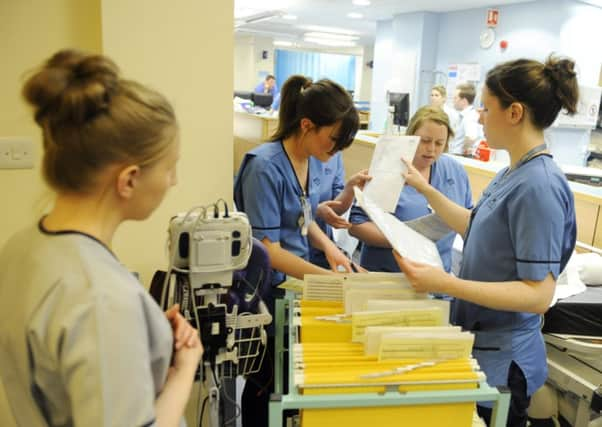Mothers ‘not always treated kindly’ in hospital


A survey of more than 2,300 mothers also found that a fifth of women were left alone during their labour at a time that was worrying for them.
But the research - the first of its kind in 15 years - found that the majority of women were happy with the care they received before, during and after having their baby.
Advertisement
Hide AdAdvertisement
Hide AdThe report - Having a baby in Scotland 2013 - found that 91 per cent of women rated their antenatal care as good or excellent, while 93 per cent were positive about their labour and birth.
There was a lower positive rating for care in hospital after birth, with 83 per cent saying it was good or excellent.
And 91 per cent were positive about the care they received at home after birth.
The most concerning aspect of maternity care appeared to relate to services provided in hospital after giving birth.
The survey found 5 per cent said they were not treated with kindness and understanding while in hospital after giving birth, while 28 per cent said this happened sometimes.
The report authors said: “A concerning finding was that during postnatal care in hospital one third of women felt that they were not always treated with kindness and understanding.
“The first few days following childbirth are crucial in promoting mothers’ parenting confidence, bonding and physical recovery.
“Key to improving women’s experience of care is communication, listening and support; however postnatal care in hospital is often provided in a context of time and workload pressure and this may not enable staff to always provide women centred care.”
Advertisement
Hide AdAdvertisement
Hide AdThe survey also found a 20 per cent of women said they felt they had been left alone when it worried them at some point during labour or birth, and for 10 per cent of women this was during early labour.
The report said: “Not all women felt that they received assistance within a reasonable time when they called and some felt that their concerns were not always taken seriously.”
The authors recommended that women’s concerns about being left alone in early labour be taken seriously, with efforts to help patients understand and cope in the early stages.
Other concerns raised by the report included that 44 per cent of women said they did not get enough information to help them decide where to have their baby, and 25 per cent said they were not offered a choice about where to give birth.
The survey also suggested that more could be done to promote giving birth in upright positions, which has been shown to help the birthing process. Over half of women reported giving birth either lying flat or with their legs in stirrups.
Public Health Minister Michael Matheson said: ”It is extremely encouraging that so many of the mums surveyed rated their care as either excellent or good, however there is no excuse for poor quality care in any circumstances, no matter how rare.
“We have already begun tackling some of the issues identified by this survey through our Refreshed Framework for Maternity Care which outlines the services we expect to be in place for women and babies throughout antenatal, labour and postnatal care.”
Gillian Smith, director for Scotland at the Royal College of Midwives, said: “Maternity services have made great strides over recent years and these figures show that most women are getting safe, high quality care in Scotland.
Advertisement
Hide AdAdvertisement
Hide Ad“However, these figures also show that there is still some work to do.
“Women should be encouraged to book early for maternity care. We also need to ensure that mothers get continuity of that care through the antenatal period and of course one-to-one care in labour so that they feel supported and also to ensure the best outcomes for them.”